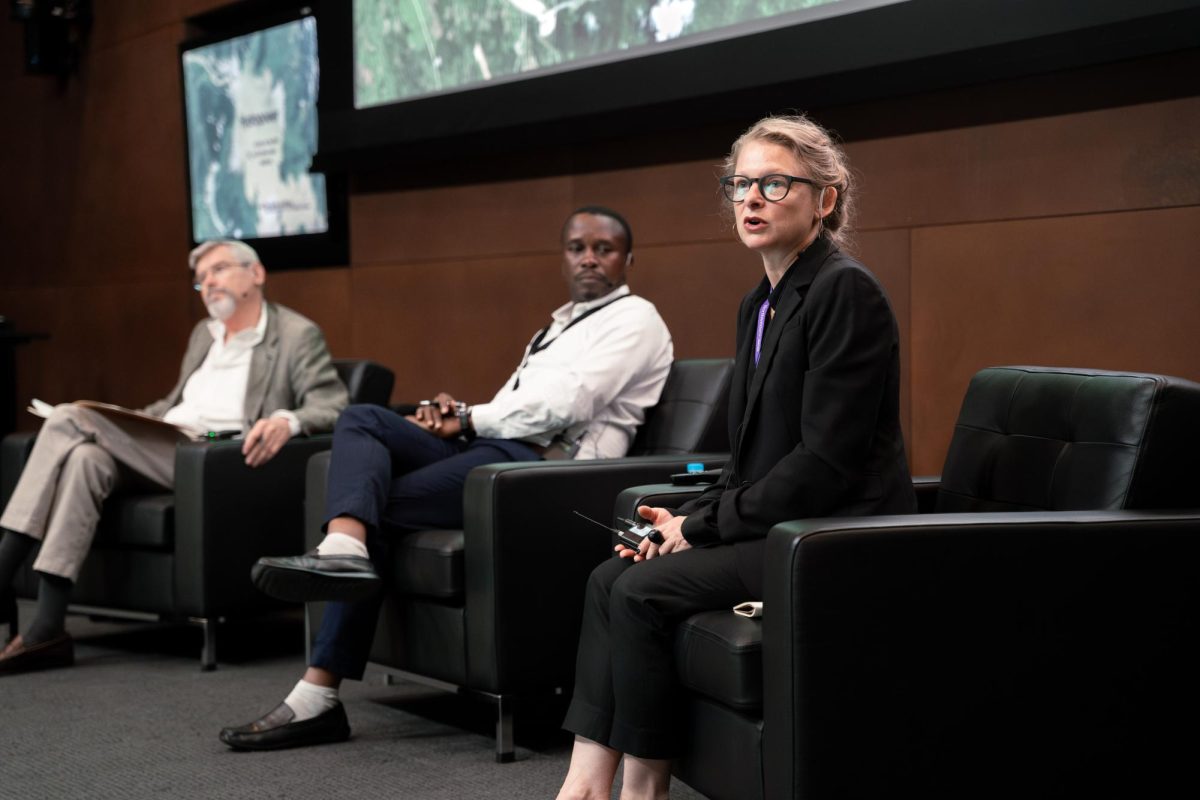The Nile is the lifeblood of Egypt, and the construction of the Grand Ethiopian Renaissance Dam on its banks has profound ecological and social consequences, journalist Ann Neumann said at a recent community discussion at Northwestern University in Qatar.
Tom Hundley, senior editor at the U.S.-based Pulitzer Center on Crisis Reporting, moderated the Oct. 17 event featuring Pulitzer fellows Neumann and Fredrick Mugira, who described current efforts to protect the river from exploitation by international investors.
Neumann, the author of the first-person narrative “Falling Like Leaves,” which recounts events of the war in Ethiopia leading up to a peace agreement in November 2022, described the political ramifications of the dam based on her reporting experiences in Egypt and Ethiopia. She highlighted the critical role of the Nile for Egypt, with approximately 95% of its population living along its bank, and its potential to bring electric power to Ethiopia.
“The Nile provides 95% of Egypt’s total water, but 70% of Ethiopians live without electricity,” Neumann said, calling the Ethiopian dam on the Nile, a project begun in 2011 under the Ethiopian Electric Power Corporation “a huge promise of electricity to many Ethiopians but a problem to Egypt.”
Neumann added that Egypt has historically viewed the Nile as its exclusive water source, even though it traverses 11 African countries, including Ethiopia.
While Egypt has often expressed concerns about the Ethiopian dam’s potential impact on the Nile water supply, “Ethiopia insists that they aren’t going to allow Egypt to tell them what to do with their natural resource,” which could provide a crucial means to alleviate poverty, she said.
Ethiopia’s unilateral decision to proceed with filling the dam has rekindled tensions reminiscent of the Ethiopian war, she added, and this has jeopardized Ethiopia’s plan to supply electricity to neighboring countries.
“You see Ethiopian refugees in Cairo being harassed physically and verbally assaulted,” Neumann said about the impacts of the Nile dispute. “In Ethiopia, there’s little patience for Egyptians. This international challenge is not going away anytime soon.”
Moreover, Neumann criticized both governments’ intentional fueling of tensions around the dam issue as a tactic to avoid accountability for economic and social problems afflicting their countries.
She questioned the Ethiopian government’s promise to use the dam to alleviate poverty, as there currently is no infrastructure to deliver electricity to the country’s population of 170 million. The Egyptian government is leveraging its power by blaming the Ethiopian dam rather than diversifying its sources of water, Neumann added.

The discussion also focused on the absence of coordinated efforts to safeguard the river from exploitation by international investors in the Nile Basin region.
Mugira, the co-founder of InfoNile, a geo-journalism platform that uses satellite imagery to track large-scale land acquisitions in the Nile Basin, highlighted the negative impacts of companies that acquire land for crop cultivation and water extraction in Sudan, Egypt, Uganda, Ethiopia, and other Nile Basin countries.
The majority of investors are from the Middle East, Mugira said, “arriving to cultivate a variety of crops that are harvested and exported back to the Middle East.”
“When these crops are exported, it means that profits are siphoned away, leaving indigenous communities to endure hardships,” he added.
Mugira also directs Water Journalists Africa, a network of over 700 journalists from 50 African countries who report on water issues, including the consequences of international investment along the Nile.
Mugira specifically cited Sudan, where foreign investors have secured a staggering 2.5 million hectares of land within the Nile Basin. This extensive land acquisition has led to the displacement of indigenous communities, he said, pushing them into swampy regions and compelling them to work as hired laborers on land that they previously owned.
Mugira emphasized that this encroachment of farmland onto wetlands also exacerbates the environmental challenges associated with climate change.
“Robbed of their land, the community turns into poachers of the resources they once protected,” Mugira said. “We must report on this crisis.”


